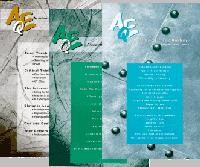- Home
- Search
- My Writing
- Writing Process
- Research Process
- Literary Studies
- Mythology
- Creative Writing
- SFF
- Learning Skills
- Biblical Studies
- Fun
The Community College Challenge

Academic Exchange Quarterly
The following article was published in the Academic Exchange Quarterly during my tenure with the journal as copy editor. Publication information is listed at the end of the essay.
In his review of Double Vision: A University for the 21st Century by James Duderstadt, George Keller suggests that the universities of the 21st century may need to "[change] gradually to become more attentive to humanistic, technological, and vocational concerns" (Keller 73). In a world where universities, to survive, must address "humanistic, technological, and vocational concerns," the community college stands uniquely positioned.
Recently Bob Davis, co-author of Prosperity: The Coming Twenty_Year Boom and What It Means to You, spoke to the faculty and staff at Chattanooga State Community College about the future of the community college movement. Davis argued for an optimistic view of the American future and emphasized the growing importance of the community college movement in that future, referring to the following quote from the introductory chapter of his book:
The two-year schools often are derided as destinations for people not smart enough, motivated enough, or rich enough to go to four-year colleges. That's an outdated image. The nation's 1,100 community colleges have evolved into institutions that successfully give workers the skills that employers need. . . . Community colleges will help increase the pool of well-trained workers over the next decade, by offering graduates a way to prosper and by easing the shortage of trained workers that has pushed their wages far above those of high school graduates. (Davis and Wessel qtd. in Business Week: Business Books)
At the same time as technology and business make demands on the community college to provide workers, those of us within the community college recognize that students need more than just the skills necessary to perform a specific job. They need communication skills, oral and written, regardless of their fields of study. They need problem-solving and critical thinking skills that allow them to discover new solutions to problems resulting both from the need for immediate responses to consumer's needs and management's demands, and from the increasing proliferation of technological innovations and resources. In a world where cooperation and collaboration are the watchwords of the day, extending from local to global levels, students need to master group dynamics and possess interpersonal skills. And above all, they need the self-discipline and self-motivation to pursue learning long after they have graduated from our programs, whether that pursuit leads them on to higher levels of education, brings them back to our campuses, or takes place at their businesses or in their homes.
This is our mandate and our privilege. The growth of technology and the expansion of the Internet, legislative agendas and concerns over fiscal responsibility and accountability, the growing interest of the private sector in the profit potential of higher education, and the needs for an increasingly literate and technologically adept workforce provide both stresses and motivations, both problems and opportunities for community colleges and those who serve within them. This new century will either see those of us in community colleges rise to the challenge or find us replaced by those who do.
Bill Stifler
Copy Editor, Chattanooga State Community College
Academic Exchange Quarterly 4.2 (2000): 129.
References
Davis, Bob and David Wessel. Chapter One: Broadly Shared Prosperity (excerpt from Davis, Bob and David Wessel. Prosperity: The Coming Twenty-Year Boom and What It Means to You. Random House, 1998). Business Week: Business Books. 3 June 2000. <http://www.businessweek.com/chapter/davis.htm>.
Keller, George. Rev. of Double Vision: A University for the 21st Century. by James Duderstadt. University Business May 2000: 72-3.
Visitors may freely link to resources on this site so long as such links do not obscure or prevent users from seeing the original web address of the page and clear acknowledgement is given of the copyright. Please obtain written permission prior to downloading, printing, or otherwise distributing any of these materials.